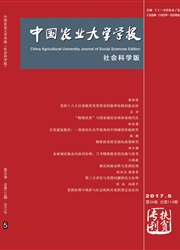

 中文摘要:
中文摘要:
文章考察了中国农村社会初级关系圈中与纠纷、争吵、不公、委屈、怨恨等道德情感性因素勾连在一起的暴力事件.基于情境、情感和力三个因素,构建了SEPV分析框架,以此来解释此类暴力行为产生及再生产的机制.研究发现,力的不均衡容易促发暴力行为,并且在纠纷演变过程中,当事人双方的力并不是一个恒量,而是会随着情境的不同而发生改变;负面情感是暴力行为的重要促动力,其强度在纠纷演变过程中同样不断变化;情境是暴力产生的环境因素,对情感和力的施与产生刺激或抑制作用.
 英文摘要:
英文摘要:
This research probes into physical violence in rural China, which takes place in the primary relationship circle. This violence is usually linked to dispute, quarrel, grievance and injustice. Based on factors including situation, emotion and power, the paper sketches the SEPV diagram to explain how the violence happens and changes. The author points out that the unbalanced power is more likely to induce violence, and during the process of dispute, the power of parties is not a constant, but changes with the change of situation. Emotion also changes during the process of dispute, and makes effect on power. Besides, situation is the environmental factor of violence production, and acts on emotion and power.
 同期刊论文项目
同期刊论文项目
 同项目期刊论文
同项目期刊论文
 期刊信息
期刊信息
